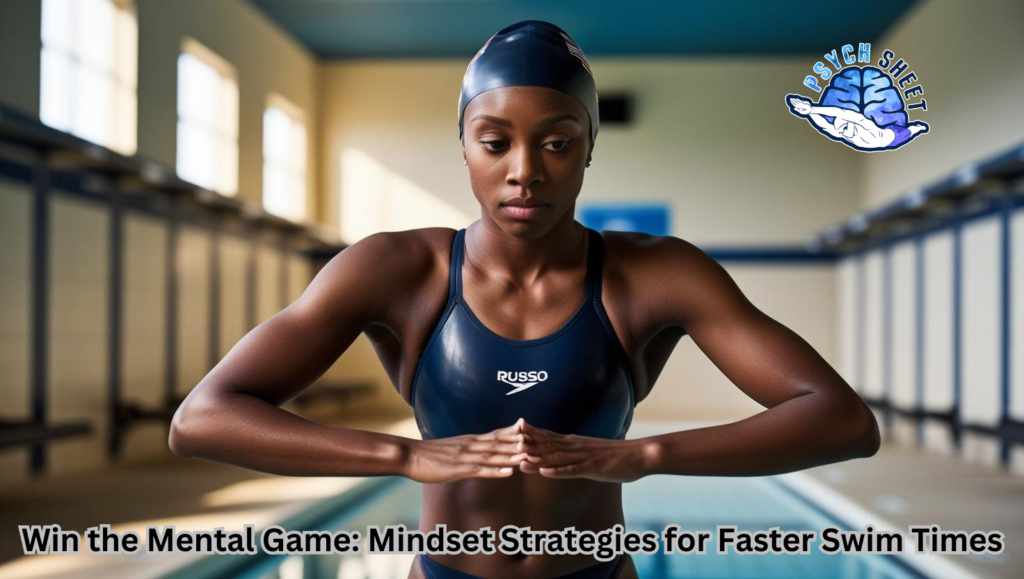Win the Mental Game: Mindset Strategies for Faster Swim Times
Competitive swimming is more than just swimming back and forth in a pool. It takes hard work, focus, and good technique. Swimmers spend many hours training their bodies. But there’s another part that’s just as important mental strength. When a swimmer feels strong on the inside, they perform better in the water. Mental training is not something extra, it’s something every swimmer needs to win the mental game.
Some swimmers do really well in practice but feel nervous or unsure during a race. This is normal. It doesn’t mean they’re not prepared. It just means they need to train their minds too.
That’s where mental training helps. It teaches swimmers how to stay calm, believe in themselves, and focus when it really matters. Tools like deep breathing, positive self-talk, and setting small goals can make a big difference. Mental training helps swimmers stay strong under pressure and bounce back after mistakes. It helps them trust their hard work and swim with confidence.
Support your swimmer in both body and mind. With strong physical training and the right mindset, they can grow, succeed, and enjoy every part of the sport even more.

Understanding Performance Anxiety
Performance anxiety is very common in swimming. As a parent, you may have seen it happen—your child swims great during practice but struggles during a race. They may look nervous, tired, or unsure.
This isn’t because they forgot how to swim. It’s because their body is reacting to pressure. When someone feels nervous, the brain sends stress signals to the body. This is called the fight-or-flight response. It can make muscles feel tight and thoughts feel messy.
But here’s the good news: these nerves are normal, and they can be managed. With the right mindset tools, swimmers can learn to stay calm and focused. Mental training helps swimmers turn fear into strength. Deep breathing, positive self-talk, and good routines can help them feel ready and in control.
When swimmers learn to win the mental game, they perform better and feel more confident. They don’t let nerves take over; they use them in a healthy way. You can support this by encouraging calm thinking and steady effort. Together, you and your swimmer can turn anxiety into a chance to grow and shine.
Techniques to Enhance Mental Strength
Visualization
Visualization is a simple but powerful tool for swimmers. It means using your mind to picture your race before it happens. This helps your body and brain work together.
Ask your swimmer to sit quietly, close their eyes, and imagine every part of the race. They can picture the buzzer, the push off the block, the strokes, the turns, and the finish. The more detail, the better.
When swimmers “see” their race in their mind, they feel more ready and less nervous. It becomes something they’ve already done, so race day doesn’t feel so scary. Doing this often can really help. It builds confidence, focus, and calmness. It also teaches swimmers how to win the mental game by staying strong inside, even when there’s pressure outside.
Visualization is not magic, but it’s very powerful. It prepares swimmers to face races with a clear, steady mind. And the more they practice it, the more natural it becomes. So remind your swimmer: imagine it first, then go out and do it. That’s how champions start by winning the mental game before the race even begins.
Mindfulness Training
Mindfulness training helps swimmers stay calm and focused during a race. It means paying attention to the present moment instead of worrying about the past or future.
When swimmers practice mindfulness, they focus on things they can control like their breathing, their stroke, or how their body feels in the water. This helps block out distractions like noise, other swimmers, or nervous thoughts.
One easy way to stay mindful is by using a simple phrase or mantra. For example, saying “strong and steady” or “one lap at a time” in their mind can help swimmers stay focused. These words remind them to stay calm and keep going.
Mindfulness can turn a good swim into a great one. It teaches swimmers to stay grounded, even when the pressure is high. This is a big part of learning how to win the mental game. With practice, mindfulness becomes a habit. And when a swimmer feels focused and in control, they’re more likely to swim their best. Encourage your swimmer to try it before each race. A calm mind can lead to a strong performance.
Reframing Anxiety
It’s very normal for swimmers to feel nervous before a race. That nervous feeling is called anxiety, and it happens to almost everyone. But here’s the good news; it doesn’t have to be a bad thing.
You can teach your swimmer to look at nerves in a new way. Instead of thinking, “I’m scared,” they can say, “I’m excited.” That’s because the body feels the same in both cases fast heartbeat, butterflies, and energy.
By changing the way they think, your swimmer can use those feelings to swim better. It’s their body saying, “I’m ready to go!” You can also help them stay calm by teaching deep breathing. One great method is belly breathing (diaphragmatic breathing). Slow, deep breaths can help settle their nerves and keep their mind focused.
This simple change in mindset can help your swimmer win the mental game. Instead of letting anxiety take over, they learn to use it as a boost. So next time your swimmer feels nervous, remind them: it’s just their body getting ready to shine. With the right tools, those nerves can turn into power.
Building Resilience
Resilience means staying strong when things get tough, and every swimmer needs it. In swimming, not every race will go well. Mistakes and setbacks happen. What matters most is how swimmers bounce back.
Help your swimmer stay positive by setting small, clear goals. For example, they can focus on making a better streamline or improving their flip turns. These small steps lead to big progress and show that effort matters more than winning.
This kind of thinking builds a growth mindset. It teaches swimmers to value learning and improvement, not just results. Even if they don’t win, they can still feel proud of what they worked on. When swimmers focus on what they can control, they feel more confident, even when things don’t go perfectly. This is how they start to win the mental game.
Remind your swimmer: setbacks are not the end; they’re part of the journey. Every challenge is a chance to grow stronger. And the more they bounce back, the more resilient they become in swimming and in life. That strength will help them go far, in the pool and beyond.
Your Role as a Parent
As a parent, you are one of the most important people in your swimmer’s life. Your words, actions, and support shape how they feel about swimming, and themselves.
Focus on Effort, Not Results: Instead of just asking, “Did you win?”, try saying, “I saw how hard you worked.” When swimmers know their effort matters, they stay motivated and proud, no matter the outcome.
Offer Emotional Support: Let your swimmer set their own goals. Remind them that your love and support are not based on how they perform. This helps them feel safe and builds strong self-worth.
Celebrate Small Wins: Did they finish a hard set? Improve a turn? Stay calm before a race? These small victories deserve just as much celebration as a medal. They help swimmers grow stronger inside.
Your biggest job is simple: be their cheerleader. Be the calm, kind voice that helps them smile after a hard day. With your steady support, your swimmer learns how to win the mental game. They learn that success is more than times or trophies; it’s about growth, effort, and love. That’s the environment where champions are truly made.
Why Mental Coaching Creates Better Swimmers
Mental coaching helps swimmers become not only faster but also stronger inside. Every swimmer is different. Some feel nervous before races. Others worry too much about being perfect or doubt themselves. Mental coaching gives each swimmer the right tools for their needs.
With mental coaching, swimmers learn how to calm their minds and stay focused. They practice skills like visualization (picturing their race), mindfulness (staying in the moment), and goal-reframing (focusing on effort instead of just results). These tools help swimmers feel more confident and ready, even under pressure.
When swimmers use these tools often, they start to win the mental game. They don’t freeze at the block or get upset over mistakes. They stay calm, focused, and strong, no matter what happens in the pool.
Mental coaching isn’t just for winning races. It helps swimmers grow into confident people who can handle challenges in school, work, and everyday life. By supporting mental coaching, you’re giving your swimmer skills they’ll carry for years. It’s not just about swim times; it’s about helping them feel strong, proud, and ready for anything.
Help Your Swimmer Win the Mental Game
Developing mental strength is essential for success in competitive swimming. If you’re ready to take the next step, we at Psychsheet are here to help.
Schedule a call with one of our coaches and empower your swimmer with mindset strategies tailored to their needs. With the right tools, your swimmer can do more than compete. They can thrive, both physically and mentally.
Click here to learn more and support your swimmer’s mental game today.
